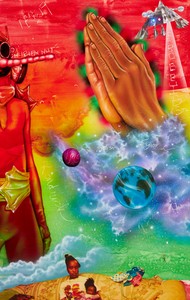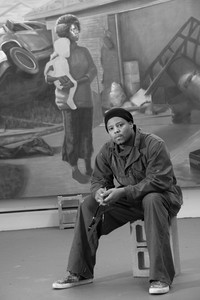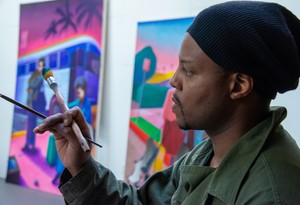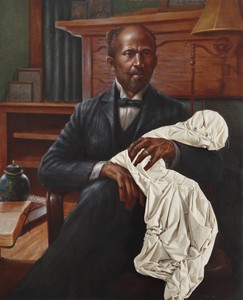
Black Futurity: Lessons in (Art) History to Forge a Path Forward
Jon Copes asks, What can Black History Month mean in the year 2024? He looks to a selection of scholars and artists for the answer.
If we don’t amend history by making new images and new representations, we are always going to be excluding ourselves.
—Titus Kaphar
Painter, sculptor, filmmaker, and installation artist Titus Kaphar confronts history by dismantling classical structures and styles of visual representation in Western art in order to subvert them. Dislodging entrenched narratives from their status as “past” so as to understand and estimate their impact on the present, he exposes the conceptual underpinnings of contested nationalist histories and colonialist legacies and how they have served to manipulate both cultural and personal identity.
Through the deconstructive techniques of cutting, shredding, stitching, binding, and erasing both subject and support, Kaphar reconstructs new codes and modalities, reckoning on Black possibilities. In Yet Another Fight for Remembrance (2014), he used thick white brushstrokes to obscure the gesturing bodies of a group of African American men in the “Hands up, don’t shoot” position, and then repainted their outlines in black to reassert their formal presence. Thus the painting process itself became the embodiment of the ongoing struggle for social visibility and recognition. During his 2017 TED Talk, Kaphar performed, onstage, the whitewashing of his large-scale painting Shifting the Gaze (2017). Based on Frans Hals’s Family Group in a Landscape (1645–48), which portrays a wealthy Dutch family and their African servant, Kaphar’s version eclipsed the family group with white paint, shifting attention entirely to the presence of this young servant.
Kaphar’s art addresses salient social and political concerns, but it also springs from his own life story. For example, his encounter with his estranged father, Jerome, has led to an ongoing multimedia exploration of the criminal justice system called The Jerome Project (2014–). This series of portraits began with Kaphar’s online discovery of the mug shots of ninety-seven African American men who shared his father’s first and last names. He paints gilded portraits of each man in the style of Byzantine devotional icons, and then dips them in tar. Initially, the depth to which each painting was immersed in tar corresponded to the time that each subject had spent behind bars; in later paintings, this has increased to represent the longer-term implications of social silencing that results from their incarceration.


Jon Copes asks, What can Black History Month mean in the year 2024? He looks to a selection of scholars and artists for the answer.

Titus Kaphar and director Derek Cianfrance spoke on the opening night of Titus Kaphar Selects, a film program curated by the artist as part of a series copresented by Gagosian and Metrograph in the spring of 2023. The pair discussed their respective practices, including Cianfrance’s film Blue Valentine (2010) and Kaphar’s film Exhibiting Forgiveness, which premiered at the Sundance Film Festival on January 20, 2024.

Jamillah Hinson and Marissa Del Toro, recent curatorial fellows of Titus Kaphar’s nonprofit community arts hub NXTHVN, address their curatorial praxes.
Join Titus Kaphar and Zoé Whitley as they discuss the artist’s recent exhibition New Alte̲rs: Reworking Devotion, featuring paintings and sculptures in which Kaphar examines the history of representation by altering the work’s supports to reveal oft unspoken social and political truths.
NXTHVN is a new national arts model that empowers emerging artists and curators of color through education and access. Through intergenerational mentorship, professional development, and cross-sector collaboration, NXTHVN accelerates professional careers in the arts. Join Titus Kaphar and Jason Price on a tour of the organization’s headquarters in New Haven, Connecticut. They discuss the founding and vision for this singular arts space.
Join the artist in his studio in New Haven, Connecticut, where he speaks about his latest paintings.
In this TED talk, presented during the sweeping protests against racism and police violence following the killing of George Floyd, Titus Kaphar describes how the beauty of a painting can draw the viewer in and allow difficult conversations to emerge. Kaphar discusses his own work and shares the idea behind NXTHVN, a new national arts model he founded to empower artists of color through education and access.

Titus Kaphar and Tochi Onyebuchi present an excerpt from their short story “Seeing the Child,” a poetic rumination on Kaphar’s latest body of work, From a Tropical Space (2019–).

Jacoba Urist reports on a recent trip to the artist’s studio in New Haven, Connecticut, to see his new body of work, From a Tropical Space (2019–). She writes on the emotional and sensory impact of these paintings and considers their singular place in Titus Kaphar’s oeuvre.

Bridget R. Cooks investigates the aesthetic and narrative conventions deployed by the artist, demonstrating how his paintings force provocative confrontations with history through complex modes of depiction.
Join Titus Kaphar as he talks about making paintings and sculptures that wrestle with the struggles of the past while speaking to the diversity and advances of the present. Working onstage, he points to the narratives coded in the language of art history as he creates a new painting, demonstrating how shifting our focus can prompt us to ask questions and confront unspoken truths.
Request more information about
Titus Kaphar